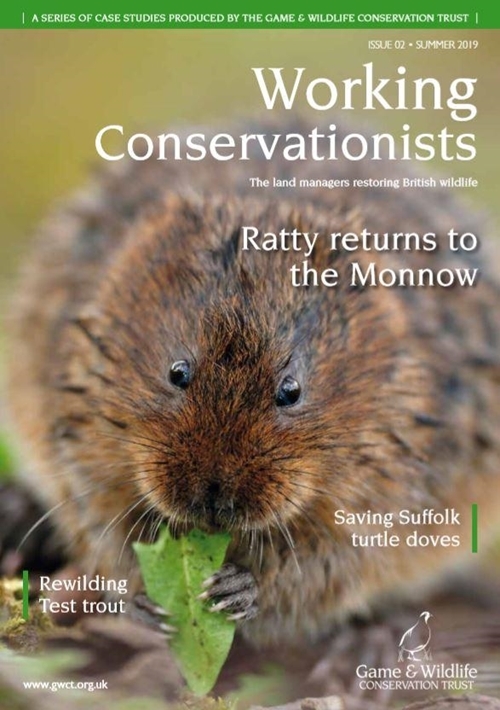The latest State of Nature report rightly grabs the headlines with a vital assessment of the loss of British wildlife, but there is an “Untold Story” of private land managers’ spectacular success in reversing biodiversity declines at a local level.
Their stories are important because 75% of the country is farmed and so farmers represent potentially the largest conservation force in the country. Now is the time to mobilise that force with the right support and encouragement.

A new collection of case studies published by the Game & Wildlife Conservation Trust shows why private land managers are uniquely placed to provide a solution to biodiversity loss in the UK.
These unsung “Working Conservationists” are bucking the national trends. For example, in Suffolk red-listed turtle doves are thriving on Graham Denny’s 200-acre family farm and thanks to his dedication to feeding all year round he has ringed an incredible 32,000 songbirds on the farm, many of which are threatened species.
Along with many other woodland birds, lesser redpoll have declined nationally by 80%, but in the Ceredigion they are among 144 species of bird spotted by Terry Mills on the farm where he has planted 10 miles of hedges and 160,000 trees and shrubs. And in Aberdeenshire as well as looking after his Highland cattle John Riley attracts ospreys to his lakes and red squirrels to his bird table with a mix of pond-digging and winter feeding.
Credit is due to Government for funding agri-environment schemes which underpin almost all these case studies, but if more farmers are to be persuaded to follow their lead, it’s time for a much more positive approach that sees land managers not as the problem but as the solution: an untapped resource with practical expertise and a profound understanding of their land.
We are hopeful that future Environmental Land Management schemes will support the type of creative, often community-style conservation exemplified in the case studies. It should allow people to get beyond the difficulties encountered in recent times with Countryside Stewardship, such as bureaucracy, late payments, inflexibility and threat of fines. Graham Denny said: “I should be a good advert for the agri-environment schemes I’ve signed up to, in that I’ve got a lot of wildlife, but I can’t stick to the prescriptions. We need a more flexible approach.”
Alongside well-funded, workable schemes, it is essential to tap into human emotion and sense of community. Success happens when farmers are encouraged to take pride in their wildlife, feel responsible for its health and wish to preserve it for the next generation. Graham said, “My passion for conservation came from my father Henry and grandfather Victor who used to feed turtle doves in the farmyard.”
Rural Television presenter and farmer Adam Henson, who wrote the foreword to the collection, said: “These uplifting stories of increasing wildlife remind us of the real opportunity for British farmers to lead the world in producing the food and environmental goods we urgently need.”
Tony Juniper, Chair of Natural England, which provides conservation advice to land managers said: “Enlightened stewards of the land, such as those in GWCT’s new collection of case studies, are increasingly proving that they can be at the heart of restoring nature while running productive and profitable businesses. Encouraging land managers to adopt such approaches is an important part of the new Environmental Land Management scheme that Natural England is helping to shape, so that farmers can be properly rewarded for providing public goods alongside first-class food production.”
GWCT Chief executive Teresa Dent CBE added: “Given the right kind of funding, advice and encouragement and by working together in Farmer Clusters, private land managers have proved they can boost biodiversity in the wider working countryside. It’s time for this untold story of conservation success to become a central narrative of British wildlife restoration.”
Notes to editors
The Game & Wildlife Conservation Trust – providing research-led conservation for a thriving countryside. The GWCT is an independent wildlife conservation charity which has carried out scientific research into Britain’s game and wildlife since the 1930s. We advise farmers and landowners on improving wildlife habitats. We employ more than 60 post-doctoral scientists and other research staff with expertise in areas such as birds, insects, mammals, farming, fish and statistics. We undertake our own research as well as projects funded by contract and grant-aid from government and private bodies.
For information, contact:
Eleanor Williams
Telephone: 07592 025476
Email: press@gwct.org.uk